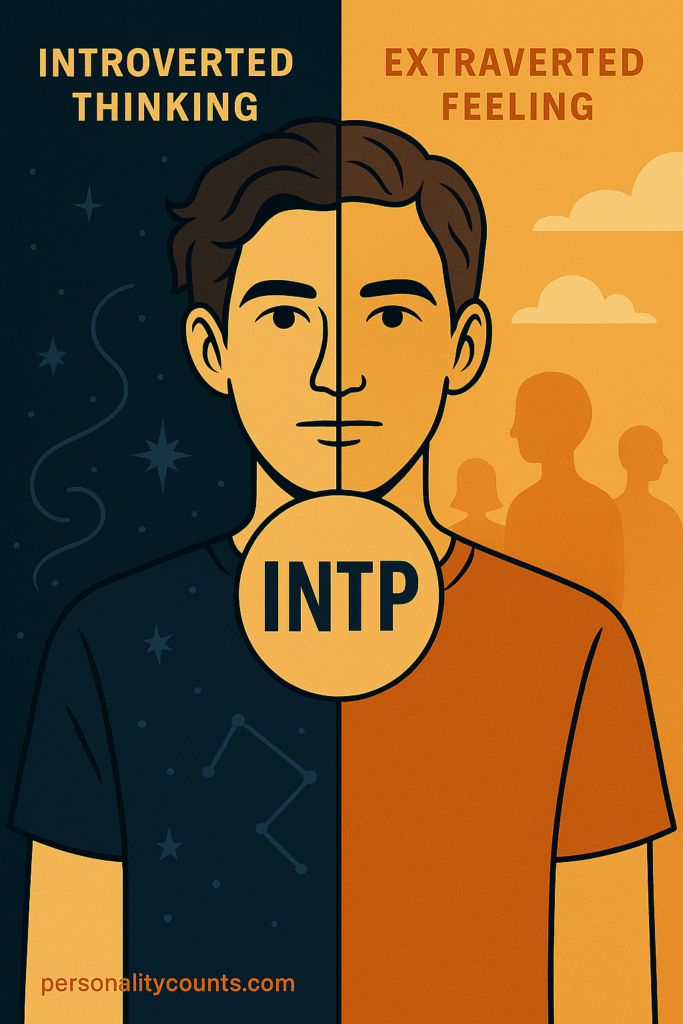
Understanding the Ti–Fe Polarity in INTPs
INTPs are curious, analytical, and independent thinkers. At the core of their personality lies their dominant function, Introverted Thinking (Ti). Ti drives their pursuit of precision, logical consistency, and an inner framework for understanding how things work. It’s why INTPs thrive in theory, abstract problem-solving, and analyzing systems others overlook.
Balancing Ti is their inferior function, Extraverted Feeling (Fe). Unlike Ti, which seeks internal accuracy, Fe is outwardly focused—it aims for harmony, shared values, and connection with others. Because Fe sits low in the INTP function stack, it can feel unfamiliar or underdeveloped, but it is not inherently negative. Instead, it plays a vital role in rounding out the INTP personality by reminding them that ideas only matter when they resonate with people.
This polarity between Ti and Fe is central to the INTP journey. Ti provides intellectual brilliance, while Fe, when integrated, adds warmth and human connection. Together, they form a balance between truth and harmony.
In Relationships
In relationships, Ti makes INTPs thoughtful and honest. They want to analyze and understand the dynamics, often asking big questions about compatibility and meaning. This intellectual approach can make them highly self-aware partners who bring clarity to discussions.
Yet relationships are not built on logic alone. Fe reminds INTPs to listen for unspoken needs, validate feelings, and show care directly. By leaning on Fe, INTPs become not only insightful but also emotionally supportive companions.
Example: An INTP may want to solve a disagreement by analyzing its root cause (Ti), but their partner may need to feel heard and understood first (Fe). By validating emotions before diving into analysis, the INTP builds trust and intimacy.
In Careers
INTPs often thrive in careers that demand analysis, creativity, and problem-solving. Their Ti helps them dissect complex systems, whether in research, engineering, philosophy, or design. They excel in roles where originality and precision matter.
Fe, meanwhile, helps them connect their ideas to others. Without it, their insights may remain abstract or misunderstood. With Fe, INTPs become effective communicators, collaborators, and mentors.
Example: An INTP scientist may design a groundbreaking theory (Ti), but by presenting it with clarity and empathy (Fe), they ensure their work inspires and influences a wider audience.
In Hobbies
Ti pulls INTPs toward hobbies like coding, writing, gaming, or puzzles—anything that challenges their analytical mind. Fe, however, steers them toward activities that involve shared meaning, such as participating in communities, collaborative projects, or creative expression meant for others.
When they balance both, INTPs not only refine their skills but also share them in ways that feel rewarding and impactful.
When Depressed
When depressed, INTPs often fall into overactive Ti, ruminating endlessly and isolating themselves. They may feel disconnected from people and trapped in negative thought loops.
Fe then tends to surface in extreme ways, either as hypersensitivity to rejection or as withdrawal out of fear of not being understood. But Fe can also be healing when used consciously—by opening up to trusted friends, seeking community, and allowing themselves to be supported, INTPs can move beyond the isolation of depression.
When Stressed
Stress amplifies the Ti–Fe polarity. Under pressure, INTPs may double down on Ti, nitpicking inconsistencies or over-analyzing. At the same time, Fe may burst out suddenly, leading them to over-apologize, worry excessively about approval, or feel an uncharacteristic need for validation.
Though disorienting, this is not inherently bad. These flare-ups highlight where Fe needs more attention. By practicing conscious empathy and balanced self-expression, INTPs can integrate Fe in healthier ways.
Handling Conflict
Conflict puts the Ti–Fe dynamic on display. Ti makes INTPs direct and precise—they want to point out flaws in reasoning and solve the problem logically. While accurate, this can feel harsh or impersonal to others.
Fe softens their delivery. By validating emotions and showing that they value harmony, INTPs can deliver truth in a way others are receptive to. This makes them not only problem-solvers but also peace-builders in conflict situations.
Blind Spot Challenge: Extraverted Sensing (Se)
Beyond Ti and Fe, INTPs also have a blind spot in Extraverted Sensing (Se). This function focuses on the immediate environment, sensory detail, and real-time adaptability—areas where INTPs often stumble.
Signs of the Se blind spot include:
- Losing track of health and physical needs while absorbed in thought
- Overreacting to sudden sensory chaos like noise or disorder
- Neglecting details until they become urgent problems
- Impulsive indulgence in sensory distractions during stress
Developing Se doesn’t mean becoming hyperactive or sensory-seeking. Instead, it means gently engaging the present moment—through mindfulness, nature walks, exercise, or creative sensory outlets. Strengthening Se grounds their big-picture insights in everyday reality.
Real-Life and Fictional Examples
- Real-Life: Many INTP thinkers, inventors, and creators are known for their Ti-driven brilliance. Those who also learn to use Fe—explaining ideas with warmth and empathy—become not just smart, but influential.
- Fictional: In The Big Bang Theory, Sheldon Cooper embodies Ti without Fe, often creating conflict through blunt logic. In contrast, an INTP like Luna Lovegood in Harry Potter shows a whimsical integration of Fe, connecting her insights to others with warmth and quirkiness.
Practical Ways for INTPs to Balance Ti and Fe
- Practice verbalizing appreciation instead of assuming others “know” how you feel
- Use empathy phrases like “I understand why you’d feel that way” before offering analysis
- Share your ideas in collaborative spaces, not just solo projects
- Explore creative expression (art, writing, music) as a bridge between thoughts and emotions
- Engage Se through grounding activities to keep ideas connected to real life
FAQ: INTP Ti–Fe Polarity
Q: What is the dominant function of INTPs?
A: Introverted Thinking (Ti) is the dominant function. It drives their love for analysis, precision, and intellectual independence.
Q: Why do INTPs struggle with Fe?
A: Fe is their inferior function, so it feels less natural. But when developed, it enhances relationships and ensures their ideas resonate.
Q: Is Fe always a weakness for INTPs?
A: Not at all. Fe adds harmony and connection, turning the INTP’s analysis into communication that others value. It only feels like a weakness when ignored or repressed.
Q: How can INTPs strengthen Fe?
A: By practicing small, consistent acts of empathy—expressing care, listening actively, and showing appreciation.
Final Thoughts
The polarity between Introverted Thinking and Extraverted Feeling defines much of the INTP personality. Ti gives them unmatched analytical clarity, while Fe provides the warmth that ensures their brilliance connects with others.
Far from being purely negative, Fe is a crucial part of the INTP growth path. When they balance Ti with Fe—and strengthen their Se blind spot—INTPs become not only insightful but also empathetic, impactful, and grounded individuals.
